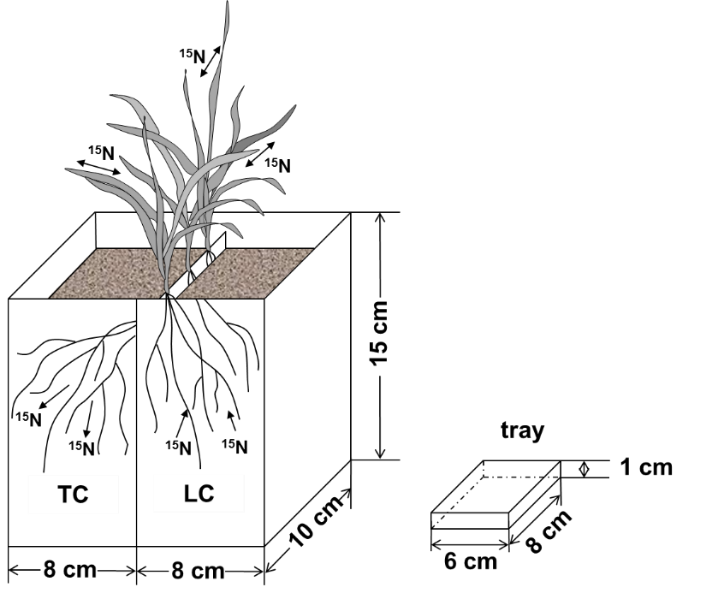The tropospheric ozone (O3) is recognized as a detrimental secondary air pollutant that can induce leaf injury and decrease photosynthesis, thereby affecting crop growth and yield. Despite past emphasis on aboveground effects, increased attention has been directed toward plant belowground processes, such as the effects of O3 on N cycling in bulk soil. Because of the living root system, O3 is expected to have a greater effect on the rhizosphere than on bulk soil. Elevated O3 has been proved to decrease nitrogen derived from rhizodeposition (NdfR). However, the changes in the partitioning of NdfR in soil N pools due to O3 remain unclear.
Here, PostDoctor Yanhong Cao and her co-advisor Professor Xueyan Liu, cooperating with Associate Professor Caiyan Lu from Institute of Applied Ecology, Chinese Academy of Science, Shenyang, conducted a pot experiment with spring wheat labeled with 15N-urea using a split-root technique (see Figure 1) under ambient and elevated O3 conditions in open-top chambers, to investigate the contribution of NdfR to different soil N pools and its response to elevated O3 conditions. Firstly, the contribution of NdfR to different N pools (i.e., mineral N, microbial biomass (MB)-N and fixed ammonium (FA)-N) at different stages was quantified. Secondly, the responses of the NdfR in different N pools to elevated O3 were discussed and found that elevated O3 decreased mineral-NdfR and increased FA-NdfR but had no significant influence on MB-NdfR. These results showed that elevated O3 altered the contribution of NdfR to soil N pools. The present study increases our understanding of the dynamics of NdfR and the changes in soil N cycling induced by projected future O3 levels.

This study entitled ‘Effects of elevated ozone on the contribution of nitrogen rhizodeposition by spring wheat to different soil N pools’ was published in <Plant and soil>. This study was supported by the National Natural Science Foundation of China (grant number 41730855; 41703005; 41671290) and the National Key Research and Development Program of China (grant number 2016YFD0800103).
Paper details: Yanhong Cao, Yi Shi, Xinchao Sun, Caiyan Lu*, Xueyan Liu*. 2018. Effects of elevated ozone on the contribution of nitrogen rhizodeposition by spring wheat to different soil N pools. Plant and Soil. 425: 321-333. DOI: 10.1007/s11104-018-3592-y.
Link: https://link.springer.com/article/10.1007%2Fs11104-018-3592-y